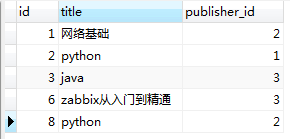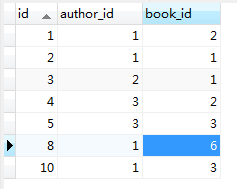We have four tables:
person_publisher

person_book

person_author

person_author_book

Next, respectively, from forward query (sub-tables -> main table) and the reverse lookup (the primary table -> sub-table) for.
1. One to One
Forward queries: Queries book in id = 2 (python) corresponding Press
book_obj=models.Book.objects.get(id=2) print(book_obj) print(book_obj.publisher.name)

Reverse lookup: Query publisher in id = (Tsinghua University Press) corresponding book 1
publisher_obj=models.Publisher.objects.get(id=1) print(publisher_obj)
#类名_set.all() print(publisher_obj.book_set.all())

2. many
Forward queries: Queries book in id = 3 (java) corresponding Press
book_obj=models.Book.objects.get(id=3) print(book_obj) print(book_obj.publisher.name)
Reverse lookup: Query publisher of id = 3 (Guangzhou University Press) corresponding book
publisher_obj=models.Publisher.objects.get(id=3) print(publisher_obj) print(publisher_obj.book_set.all())

So, if we want to query python that was published by several publishers (although generally only one), we can do this:
book_obj=models.Book.objects.filter(title='python') print(book_obj) for i in book_obj: print(i.publisher)

In fact, we found that one-to-many query and basically the same.
3. to-many
Forward Search: Find all book author named gong
author_obj=models.Author.objects.get(name='gong') print(author_obj.book.all())

Reverse lookup: Query the book as "network-based" all authors
= models.Book.objects.get book_obj (title = ' network based ' ) Print (book_obj.author_set.all ())

All in all, a positive inquiry direct order of acquisition, reverse lookup by class name (all lowercase) _set.all () to get.
Get a day, and finally a preliminary understanding of the Zenong. ! !